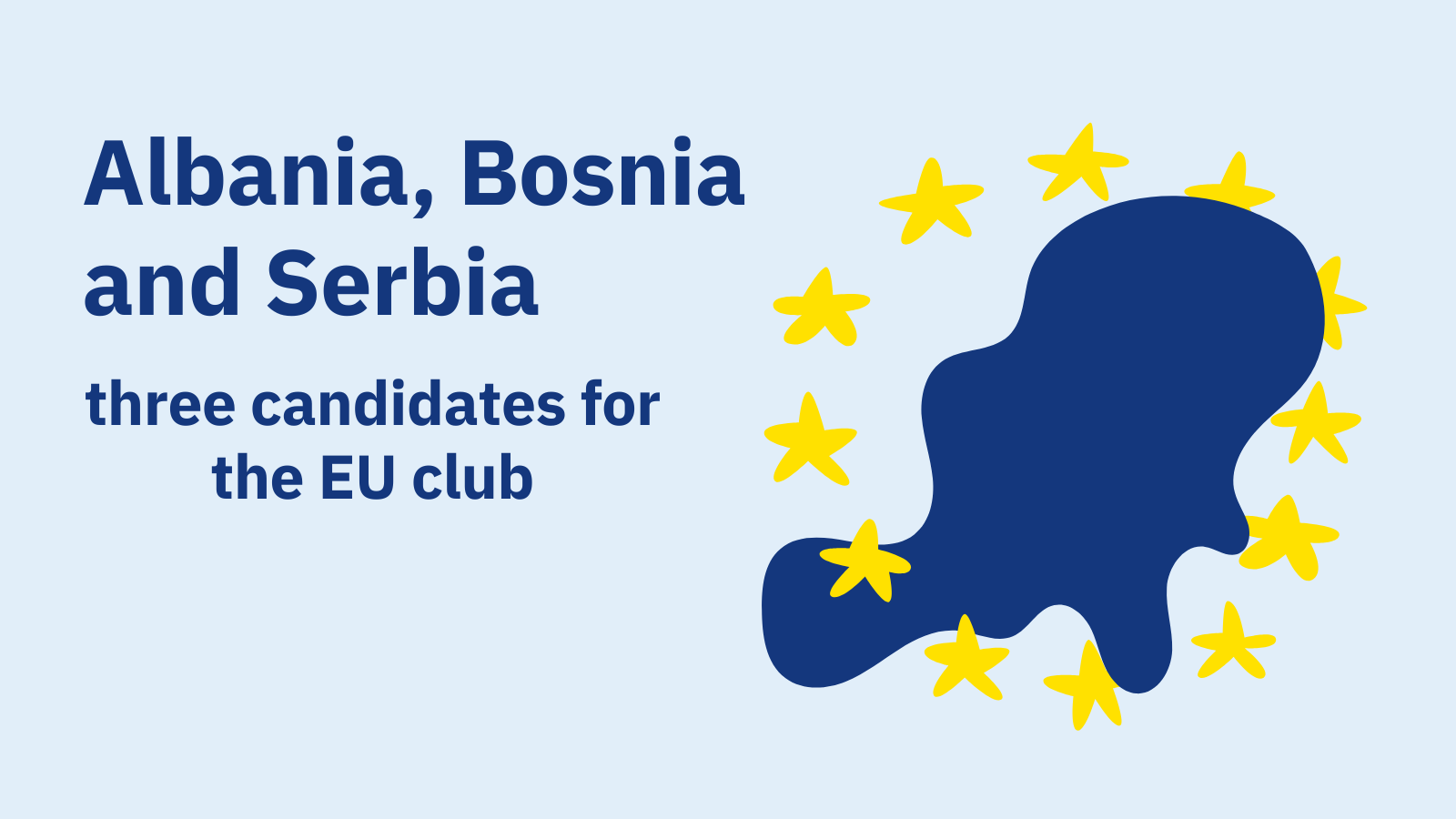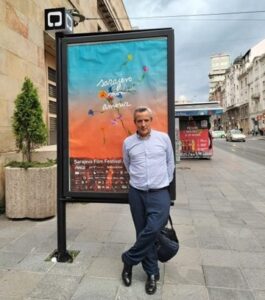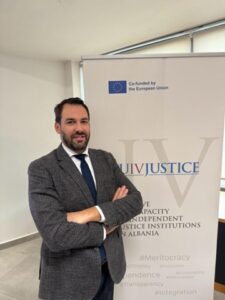-
10 January 2024
Category : Interview
Albania, Bosnia and Herzegovina and Serbia: three candidates for the EU club
Spanish Justice experts explain how EU-funded cooperation projects in Albania, Bosnia-Herzegovina and Serbia are helping them join the EU club

2024 marks the 20th anniversary of the largest ever accession of countries to the European Union. On 1 May 2004, ten new countries joined the EU club: the islands of Cyprus and Malta along with eight Central and Eastern European countries, ending the post-World War II division of Europe. Over the years, more countries have joined the EU’s borders, although the integration processes are slow and complex, requiring many structural changes in the countries’ societies in order to meet the strict conditions set by the Union as a prerequisite for membership.
With this enlargement policy, the EU seeks to unify European countries around a common political and economic project, while at the same time strengthening its presence on the international stage. However, both sides stand to gain from this process. For the candidate countries, according to EU sources, “enlargements have proved to be one of the most effective tools in promoting political, economic and social reforms, as well as in consolidating peace, stability and democracy across the continent”.
To speed up this process, the EU funds technical cooperation projects in which European specialists exchange their knowledge and experience with specialists from the candidate countries in areas such as security – to fight organised crime gangs, for example – or justice – to curb corruption, among others. In the following lines, we bring together the testimonies of three specialists from Spanish justice institutions who are participating in cooperation projects in Albania, Bosnia and Serbia. They tell us about the historical and social context of these countries, the benefits of accession and the complex processes that are being supported through European projects.
Why are countries like Bosnia, Albania and Serbia interested in joining the EU?
“In the case of Bosnia and Herzegovina, it is a way to set a path towards stability in the area and to overcome the war of the 1990s and put itself on an equal footing with Croatia, which was also part of the former Yugoslavia and is already integrated into the EU. At the same time, it is a way to neutralise the influence of Islamic countries, at least the most radical ones, with respect to the country”, responds Jorge Obach, magistrate of the General Council of the Judiciary (CGPJ) and head of the European project EU4Justice-Bosnia, which supports the fight against organised crime and corruption in Bosnia and Herzegovina (BiH).

Álvaro García, Spanish prosecutor mobilised in the framework of the EU4JUSTICE-Albania project Álvaro García, provincial prosecutor of Córdoba, and Arturo Valdés, magistrate of the CGPJ, both experts mobilised by the FIIAPP in the framework of the European project EU4Justice-Albania, for the improvement of the capacity of independent judicial institutions in Albania, answer our questions on the case of Albania. “For Albania, joining the EU represents an opportunity to strengthen its institutions and improve the quality of life of its citizens through the implementation of political, economic and social reforms. Firstly, EU membership offers access to structural cohesion funds, which can contribute to the country’s economic development. In addition, membership is accompanied by improvements in political stability, security and defence, as well as an increase in democratic and human rights standards”, say experts.
In the case of Serbia, Judge Marta Pizarro, an expert mobilised in the framework of the project financed by the European Union to support Serbia in terms of justice, freedom and security, replies: “The desire to integrate into the European Union emerged in Serbia after the armed conflicts of the 1990s, as a way to improve the quality of life of its citizens and to increase the standards of security, freedom and democracy in the country. Serbia achieved candidate status in 2012, and since then has undergone far-reaching political, legislative and economic reforms. It is arguably one of the most prepared countries in the region for accession negotiations with the EU at the moment.
However, Pizarro warns of a decline in the mood of the Serbian population: “It cannot be ignored that the initial pro-European enthusiasm has given way in Serbia to a growing scepticism, related to the slowness of the process, and to a series of political factors that hinder the country’s position in the European framework, such as the absence of sanctions against Russia or the situation in Kosovo. Therefore, given Serbia’s relevance as a country at the heart of Europe, the EU must also face the challenge of strengthening the pro-European spirit of Serbian citizens”.
What justice challenges do these countries need to address in order to meet European standards?

Magistrate Jorge Obach, mobilised in the framework of the EU4JUSTICE-Bosnia project In the case of BiH, the challenges are to “ensure the independence of the judiciary by avoiding political interference; guarantee the integrity of its members by complying with conflict of interest and asset declaration regulations; and promote the efficiency of the system, especially in investigating and prosecuting cases of corruption and organised crime,” says Obach.
According to García and Valdés, the challenges facing Albania include “the fight against corruption, the improvement of judicial independence and the efficiency of the judicial system, respect for the rule of law and fundamental rights, as well as the effective implementation of anti-crime measures”.
In the case of Serbia, Pizarro notes that these include “addressing the endemic problems of corruption in the country and strengthening the capacity of Serbian institutions to effectively investigate and prosecute organised crime cases and increasing the capacity to recover the proceeds of criminal activity”.
How are the projects supporting this accession?

Senior Judge Marta Pizarro, mobilised in the framework of the EU4JUSTICE-Serbia project In Serbia, says Pizarro, “cooperation is carried out in a cross-cutting manner, involving all actors in the criminal process, from the police to members of the judiciary and prosecutors”. Among other actions, support is being given to Serbian institutions “in the design of legislative modifications to increase the efficiency of the legal and juridical framework, and to promote tools that improve coordination between the police, the prosecution and the judiciary”.
“The EU4Justice-Bosnia project is based on four pillars: ensuring the efficiency of the system, through activities carried out by Spanish specialists in which comparative analyses between EU and neighbouring countries have been provided; guaranteeing integrity, with actions aimed at ensuring the declaration of assets; promoting compliance with the regulation of conflicts of interest, with the participation of Spanish specialists in judicial ethics; and strengthening the quality and efficiency in the way of investigating and judging, especially in corruption cases, by providing specialised training”, says the magistrate posted to BiH.
In the case of Albania, Valdés and García explain that this is being done “through the training of civil servants, the exchange of best practices, the development of institutional capacities and economic support to implement reforms”.
What successful experiences of Spain’s EU accession process could be relevant for these countries?

Spanish Magistrate Arturo Valdés, mobilised in the framework of the EU4JUSTICE-Albania project “The process of Spain’s accession to the EU accelerated the democratisation of the country, brought great social welfare, and strengthened the rule of law,” says Pizarro. “Already then, the foundations were laid for the creation of solid structures, which made it possible to progressively tackle the fight against corruption and organised crime in an efficient manner. In fact, the strength of the rule of law in Spain is highly valued by Serbian institutions as a relevant learning model”.
“It is very difficult to translate Spain’s pre-1985 status quo to present-day BiH. Spain’s success probably lay in the strength of its public administration being able (and willing) to absorb European regulation, with a quick adaptation of both internal regulations and procedures, as well as a good public awareness campaign on the advantages of EU membership. And probably because there was no other alternative,” says Justice Obach.
According to García and Valdés, some important lessons are “the importance of addressing structural reforms at the institutional and legal level, the need to promote political and social stability, as well as the commitment to the implementation of EU policies and regulations. The Spanish experience could inspire Albania to work on consolidating democracy, improving the rule of law and modernising its institutions”.
Why is international cooperation between public institutions relevant in this area?
In Obach’s view, “this is the only way to carry out any project, whatever the subject matter, effectively in any country. Only by sharing knowledge between the different public institutions and collaborating in accordance with the competences of each of them can an optimal result be achieved.
According to Valdés, “the EU seeks to ensure that candidate countries have transparent, independent and efficient judicial systems. Co-operation with public institutions in other countries facilitates the exchange of knowledge, best practices and experiences. Moreover, this collaboration, especially in areas such as justice, contributes to strengthening institutional capacity and ensuring the consistent application of European standards in the judicial and legal field”.
Judge Pizarro adds that “it cannot be overlooked that international cooperation between public institutions is fundamental to address critical issues such as the effectiveness of the fight against organised crime, given its cross-border and global nature“.
The views and opinions expressed in this blog are the sole responsibility of the person who write them.




